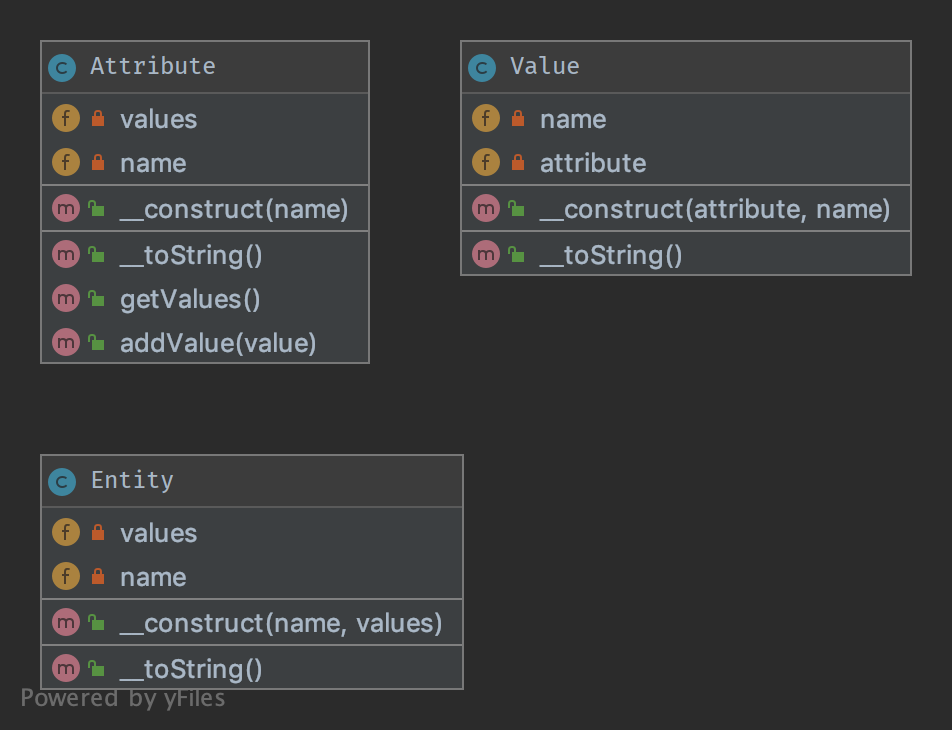4.3. Entitäts-Attribut-Wert (EAV)
Das Entitäts-Attribut-Wert (EAV)-Muster, um das EAV-Modell mit PHP zu implementieren
4.3.1. Zweck
Das Entitäts-Attribut-Wert (EAV)-Modell ist ein Datenmodell zur Beschreibung von Entitäten, bei denen die Anzahl der Attribute (Eigenschaften, Parameter), die zu ihrer Beschreibung verwendet werden können, potenziell sehr groß ist, die Anzahl, die tatsächlich für eine bestimmte Entität gilt, jedoch relativ gering ist.
4.3.2. UML Diagram

4.3.3. Code
Du kannst diesen Code auch auf GitHub einsehen
Entity.php
1<?php
2
3declare(strict_types=1);
4
5namespace DesignPatterns\More\EAV;
6
7use SplObjectStorage;
8
9class Entity implements \Stringable
10{
11 /**
12 * @var SplObjectStorage<Value,Value>
13 */
14 private $values;
15
16 /**
17 * @param Value[] $values
18 */
19 public function __construct(private string $name, array $values)
20 {
21 $this->values = new SplObjectStorage();
22
23 foreach ($values as $value) {
24 $this->values->attach($value);
25 }
26 }
27
28 public function __toString(): string
29 {
30 $text = [$this->name];
31
32 foreach ($this->values as $value) {
33 $text[] = (string) $value;
34 }
35
36 return join(', ', $text);
37 }
38}
Attribute.php
1<?php
2
3declare(strict_types=1);
4
5namespace DesignPatterns\More\EAV;
6
7use SplObjectStorage;
8
9class Attribute implements \Stringable
10{
11 private SplObjectStorage $values;
12
13 public function __construct(private string $name)
14 {
15 $this->values = new SplObjectStorage();
16 }
17
18 public function addValue(Value $value): void
19 {
20 $this->values->attach($value);
21 }
22
23 public function getValues(): SplObjectStorage
24 {
25 return $this->values;
26 }
27
28 public function __toString(): string
29 {
30 return $this->name;
31 }
32}
Value.php
1<?php
2
3declare(strict_types=1);
4
5namespace DesignPatterns\More\EAV;
6
7class Value implements \Stringable
8{
9 public function __construct(private Attribute $attribute, private string $name)
10 {
11 $attribute->addValue($this);
12 }
13
14 public function __toString(): string
15 {
16 return sprintf('%s: %s', (string) $this->attribute, $this->name);
17 }
18}
4.3.4. Test
Tests/EAVTest.php
1<?php
2
3declare(strict_types=1);
4
5namespace DesignPatterns\More\EAV\Tests;
6
7use DesignPatterns\More\EAV\Attribute;
8use DesignPatterns\More\EAV\Entity;
9use DesignPatterns\More\EAV\Value;
10use PHPUnit\Framework\TestCase;
11
12class EAVTest extends TestCase
13{
14 public function testCanAddAttributeToEntity(): void
15 {
16 $colorAttribute = new Attribute('color');
17 $colorSilver = new Value($colorAttribute, 'silver');
18 $colorBlack = new Value($colorAttribute, 'black');
19
20 $memoryAttribute = new Attribute('memory');
21 $memory8Gb = new Value($memoryAttribute, '8GB');
22
23 $entity = new Entity('MacBook Pro', [$colorSilver, $colorBlack, $memory8Gb]);
24
25 $this->assertEquals('MacBook Pro, color: silver, color: black, memory: 8GB', (string) $entity);
26 }
27}